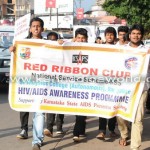Mangaluru, December 1: ‘World AIDS Day’ is celebrated on December 1st every year. This is caused by HIV virus and to create more awareness, and this celebration was introduced since 1988.
AIDS is one of the deadly diseases which is a threat to the mankind. According to the statistics of 2013, it is estimated that about 36 million people (from 1981-2012) have died and about 35 thousand people are infected by HIV virus. Hence we can say that AIDS is one of the serious health problems that the world is facing.
What is AIDS and HIV?
HIV means Human Immuno Deficiency Virus. When a person is infected by this virus, it weakens the immune system of the body and makes one susceptible to many diseases.
AIDS means Acquired Immuno Deficiency Syndrome. It does not mean that those infected by HIV have to suffer from AIDS. When the immune system of the body is weakened and the body gets affected by various diseases, the overall infections that has spoilt the immunity in the person is called AIDS.
Those suffering from AIDS are infected by HIV. But there is nothing like those infected by HIV, suffer from AIDS. When an individual’s immunity collapses, the person becomes victim to many diseases and dies.
Symptoms of AIDS:
The primary symptoms of AIDS are intermittent fever and loose motion. This will not get cured by any sort of treatment. A person looses weight without any reason. The HIV virus attacks on the WBC. Hence immunity of the body decreases and the person easily becomes victim to bacteria, fungus and other viral infections.
Basic facts about AIDS
- AIDS stands for acquired immune deficiency syndrome.
- AIDS is also referred to as advanced HIV infection or late-stage HIV.
- Someone with AIDS may develop a wide range of other health conditions including: pneumonia, thrush, fungal infections, TB, toxoplasmosis and cytomegalovirus.
- There is also an increased risk of developing other life-limiting conditions, including cancer and brain illnesses.
- CD4 count refers to the number of T-helper cells in a cubic millilitre of blood. When a person’s CD4 count drops below 200 cells per millilitre of blood, they are said to have AIDS.
The initial symptoms of acute HIV infection may include:
- Headache
- Diarrhea
- Nausea and vomitting
- Fatigue
- Aching muscles
- Sore throat
- Red rash that doesn’t itch, usually on the torso.
- Fever
How does HIV transmit?
- Sexual contact that involves semen, vaginal fluids or blood.
- Direct blood contact, particularly through sharing injection drug needles or ‘works’ (cotton, cookers, etc).
- Infections due to blood transfusions, accidents in health care settings or certain blood products are possible, although they are extremely rare in the United States.
- Mother to baby (before or during birth, or through breast milk)
Bodily Fluids that are NOT infectious:
- Saliva /Spit
- Tears
- Sweat
- Feces / Poop
- Urine / Pee
Treatments and drugs:
There’s no cure for HIV/AIDS, but a variety of drugs can be used in combination to control the virus. Each class of anti-HIV drugs blocks the virus in different ways. It’s best to combine at least three drugs from two classes to avoid creating strains of HIV that are immune to single drugs.
Person infected person can live like other persons. The fear about the disease in a patient spoils his confidence.
To prevent even such rare occurrences, one should take the following precautions when caring for someone living with HIV:
- Wear gloves if you are going to have contact with blood or other body fluids that could possibly contain visible blood, such as urine, feces, or vomit.
- Cover cuts, sores, or breaks in the skin with bandages. This applies to both you and the person living with HIV/AIDS.
- Wash your hands and other parts of your body immediately after contact with blood or other body fluids. Disinfect surfaces soiled with blood.
- Avoid practices that increase the likelihood of blood contact, such as sharing of razors and toothbrushes.
- Use needles and other sharp instruments only when medically necessary and handle them according to recommendations for healthcare settings. (Do not put caps back on needles by hand or remove needles from syringes. Dispose of needles in puncture-proof containers out of the reach of children and visitors.)
Measures to prevent the spread of HIV:
- Safe sexual methods
- Avoiding un-natural sexual habits
- Use disposable syringes
The HIV infected person must meet the doctor in time and clear his confusions. He must eat good food and take medicines regularly. The way in which the society treats the person should change. Only then the World AIDS Day will gain value and meaning.



